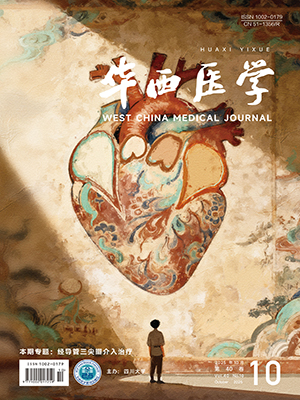| 1. |
中华医学会神经病学分会, 中华医学会神经病学分会脑血管病学组, 刘鸣, 等. 中国急性缺血性脑卒中诊治指南2014. 中华神经科杂志, 2015(4): 246-257.
|
| 2. |
马艳霞, 吕肖锋, 焦秀敏, 等. 2型糖尿病合并急性脑梗死患者血糖波动与溶栓预后的关系. 中国脑血管病杂志, 2014, 11(8): 415-419.
|
| 3. |
Bruno A, Levine SR, Frankel MR, et al. Admission glucose level and clinical outcomes in the NINDS rt-PA stroke trial. Neurology, 2002, 59(5): 669-674.
|
| 4. |
Meurer WJ, Scott PA, Caveney AF, et al. Lack of association between hyperglycaemia at arrival and clinical outcomes in acute stroke patients treated with tissue plasminogen activator. Int J Stroke, 2010, 5(3): 163-166.
|
| 5. |
Tziomalos K, Dimitriou P, Bouziana SD, et al. Stress hyperglycemia and acute ischemic stroke in-hospital outcome. Metabolism, 2017, 67: 99-105.
|
| 6. |
Cao W, Ling Y, Wu F, et al. Higher fasting glucose next day after intravenous thrombolysis is independently associated with poor outcome in acute ischemic stroke. J Stroke Cerebrovasc Dis, 2015, 24(1): 100-103.
|
| 7. |
Gillett MJ. International Expert Committee report on the role of the A1C assay in the diagnosis of diabetes. Diabetes Care, 2009, 32(7): 1327-1334.
|
| 8. |
Danne T, Weber B, Dinesen B, et al. Threshold of HbA1c for the effect of hyperglycemia on the risk of diabetic microangiopathy. Diabetes Care, 1996, 19(2): 183.
|
| 9. |
Lindsberg PJ, Kaste M. Thrombolysis for acute stroke. Curr Opin Neurol, 2003, 16(1): 73-80.
|
| 10. |
Rocco A, Heuschmann PU, Schellinger PD, et al. Glycosylated hemoglobin A1 predicts risk for symptomatic hemorrhage after thrombolysis for acute stroke. Stroke, 2013, 44(8): 2134-2138.
|
| 11. |
American Diabetes Association. Diagnosis and classification of diabetes mellitus. Diabetes Care, 2013, 36(Suppl 1): S67-S74.
|
| 12. |
Pan Y, Jing J, Chen W, et al. Post-glucose load measures of insulin resistance and prognosis of nondiabetic patients with ischemic stroke. J Am Heart Assoc, 2017, 6(1): e004990.
|
| 13. |
Brott T, Adams HP Jr, Olinger CP, et al. Measurements of acute cerebral infarction: a clinical examination scale. Stroke, 1989, 20(7): 864-870.
|
| 14. |
Adams HP Jr, Bendixen BH, Kappelle LJ, et al. Classification of subtype of acute ischemic stroke. Definitions for use in a multicenter clinical trial. TOAST. Trial of org 10172 in acute stroke treatment. Stroke, 1993, 24(1): 35-41.
|
| 15. |
王秀容, 喻明. 重组组织型纤溶酶原激活剂静脉溶栓治疗不同年龄段急性脑梗死的临床疗效观察. 实用医院临床杂志, 2019, 16(4): 111-114.
|
| 16. |
Levetan CS. Effect of hyperglycemia on stroke outcomes. Endocr Pract, 2004, 10(Suppl 2): 34-39.
|
| 17. |
Desilles JP, Meseguer E, Labreuche J, et al. Diabetes mellitus, admission glucose, and outcomes after stroke thrombolysis: a registry and systematic review. Stroke, 2013, 44(7): 1915-1923.
|
| 18. |
Litke R, Moulin S, Cordonnier C, et al. Influence of glycaemic control on the outcomes of patients treated by intravenous thrombolysis for cerebral ischaemia. J Neurol, 2015, 262(11): 2504-2512.
|
| 19. |
Aso Y, Inukai T, Tayama K, et al. Serum concentrations of advanced glycation endproducts are associated with the development of atherosclerosis as well as diabetic microangiopathy in patients with type 2 diabetes. Acta Diabetol, 2000, 37(2): 87-92.
|
| 20. |
Engoren M, Schwann TA, Habib RH. Response to: elevated hemoglobin A1c is associated with readmission but not complications. Asian Cardiovasc Thorac Ann, 2014, 22(7): 886.
|
| 21. |
苏量. 脑梗死早期神经功能恶化的临床特征及与血清糖化血红蛋白的相关性分析. 神经损伤与功能重建, 2017, 12(4): 354-355, 363.
|
| 22. |
Pandolfi A, Giaccari A, Cilli C, et al. Acute hyperglycemia and acute hyperinsulinemia decrease plasma fibrinolytic activity and increase plasminogen activator inhibitor type 1 in the rat. Acta Diabetol, 2001, 38(2): 71-76.
|
| 23. |
Wu L, Shi W, Li X, et al. High expression of the human equilibrative nucleoside transporter 1 gene predicts a good response to decitabine in patients with myelodysplastic syndrome. J Transl Med, 2016, 14: 66.
|
| 24. |
陈立云, 王拥军, 赵性泉. 脑梗死后出血性转化的研究进展. 中国卒中杂志, 2006(12): 904-906.
|
| 25. |
Tamura Y, Araki A. Diabetes mellitus and white matter hyperintensity. Geriatr Gerontol Int, 2015, 15(Suppl 1): 34-42.
|
| 26. |
Bezerra DC, Sharrett AR, Matsushita K, et al. Risk factors for lacune subtypes in the Atherosclerosis Risk in Communities (ARIC) Study. Neurology, 2012, 78(2): 102-108.
|




